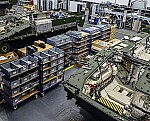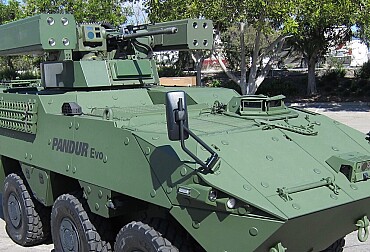USA: The Israelis are not crossing the line in Rafah. The tragic deaths of civilians may have been caused by the ignition of a weapons depot
For the first time, the Israeli army has entered the centre of the southernmost Gaza Strip town of Rafah with tanks as part of its ongoing offensive against Hamas terrorists. The advance came two days after a devastating fire at a camp in the town, where Islamist-controlled authorities say more than 40 people were killed. Israel claimed responsibility for the strike on two officials of the terrorist organization, but denied that the explosives it was currently using in the area had caused such devastation. One version of the investigation, according to the Israelis, is the possibility that Hamas had a weapons and explosives depot in the area that caught fire. Meanwhile, the U.S. says Israel is following earlier agreements in the area to minimize civilian casualties.
As displaced Palestinians flee Rafah back north to Khan Younis, the Israelis continue to advance in southern Gaza itself, where Jerusalem says several strategic tasks still remain to be accomplished. The main objective remains clear: to bring home the remaining dozens of hostages, who the Israelis believe may also be in Rafah, and to neutralize the Hamas terrorists and Hamas-affiliated groups responsible for attacks on the Jewish state. Yet the intended plan did not sit well with the main US partner, which warned of heavy civilian casualties. The Israelis therefore adjusted their tactics in late May, concentrating on slower advances on foot and more targeted attacks using fewer explosives.

Nevertheless, there were heavy civilian casualties in the crowded refugee camp in late May. Terrorist-dominated authorities speak of more than 40 dead after an airstrike set fire to buildings and tents around the Israeli target. A pair of Hamas leaders were believed to be there and were eliminated in the attack. The Israeli army says it used a 17-kilogram charge, which it says could not have caused such a devastating fire. "We are looking into all possibilities, including the possibility that there were weapons stored in a warehouse in the area next to our target that we did not know about. These could then have ignited as a result of the strike," IDF spokesman Daniel Hagari said in a televised briefing, according to Reuters, adding that footage of the incident suggested there were secondary explosions after the attack, which, along with the fact that there was no larger crater at the site, would support the ammunition depot version.
"We do not and will not support a major ground operation in Rafah. President Biden said that if that happens, it may cause him to have to make another decision in terms of supporting Israel. But we haven't seen that at this point. We haven't seen them raid Rafah in a big way," White House security spokesman John Kirby told the BBC, reaffirming that Israel has put the discussions on mutual terms and toned down the intensity of the offensive. "We didn't see them go in there in large numbers, with large numbers of troops, in columns of equipment and formations, in some kind of coordinated maneuver against multiple ground targets," Kirby added, stressing that the images of the devastation after the Rafah fire were tragic and that there must be no loss of civilian life on either side in this conflict.
Some partners in Western Europe, on the other hand, recognise the state of Palestine in light of what they see as Israel's overly harsh approach. After Spain, Ireland and Norway, French President Emmanuel Macron was the latest to raise the idea. "Recognition of Palestine must be made at the right moment, it should not be emotional," he said in a statement on the X network, adding that he was ready to take the step in the future, outraged by the Israeli attacks in Rafah, saying the operation must stop immediately.
But Israel is not yet counting on that. Its leaders have repeatedly insisted that they will not be able to achieve victory in their now nearly eight-month war unless they militarily take Rafah, return home the surviving Israelis and dismantle all the terror cells they have identified in the area. As it has done further north in the Gaza Strip, the Israeli army has presented a wealth of evidence that Hamas Islamists and other groups are using the civilian infrastructure environment for their activities. Whether it is weapons depots in hospitals and schools, or tunnels and bases under Palestinian homes. This is one of the reasons why the process in Rafah is extremely difficult and dangerous for ordinary people. Since the bloody 7 October, when 1 200 Israelis died and 250 were taken to Gaza, the Israelis have stressed that their aim is to disperse all terrorist structures - so that they cannot re-establish tyrannical rule once the offensive operations are over.









